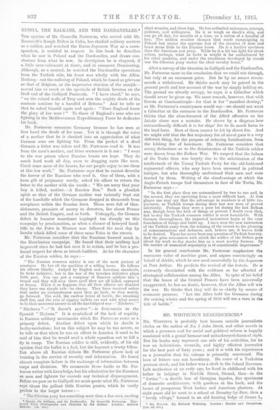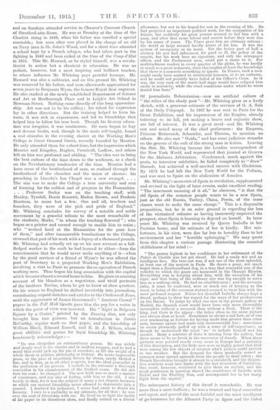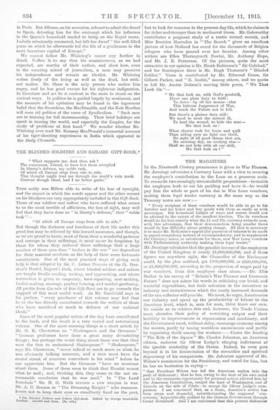MR. WHITEING'S REMINISCENCES.*
Mn. WIIITEING is probably best known outside journalistic" circles as the author of No. 5 John Street, and other novels in which a generous zeal for social and political reform is happily combined with a genial humour and unhaekneyed charm of style. But his books only represent one side of his activities, for he was an industrious, versatile, and highly efficient journalist for the best part of forty years ; and it is with his experiences as a journalist that his „volume is primarily concerned. His love of letters was not hereditary. He came of a Yorkshire yeoman stock, and his father was a clerk in the Inland Revenue. Left motherless at an early age, he lived in childhood with his father in lodgings in Norfolk Street, Strand, then—in the "forties "—a double line of Georgian façades, fine specimen,' of domestic architecture, with gardens at the back, and the haunt of prosperous West Indian and American planters. At eight-years old he went to a school at Bromley-by-Bow, then a "lovely village," housed in an old hunting lodge of James I., * My Harvest. By Itiohard Whitely. London: Sadder and Stoughton. Ma. Id. net.)
and on Sundays attended service in Chaucer's Convent Church of Stratford-atte-Bowe. He was at Bromley at the time of the Chartist listing in 1848, when his father was enrolled a special constable ; but soon after was placed in the charge of an old ex-Navy man in St. John's Wood, and for a short time attended a school kept by a French refugee, who had taken part in the fighting in 1848 and been exiled at the time of the Coup d'Etat in 1851. This Mr. Howard, as he styled himself, was a revolu- tionist in action but a classicist in education. He was no pedant, however, but a most inspiring and brilliant teacher, to whose influence Mr. Whiteing pays grateful homage. Mr. Howard was also a militarist, and on this ground Mr. Whiteing was removed by his father, and soon afterwards apprenticed for seven years to Benjamin Wyon, the famous Royal Seal engraver. He also studied at the newly established Department of Science and Art at Marlborough Place and in Leigh's Art School in Newman Street. Nothing came directly of this long apprentice- ship. Art was not to be his calling ; his talent for expression lay in other directions. But the training helped to form his taste, it was rich in experiences, and led to friendships that helped him to follow his true bent. Though his literary educa- tion was irregular, it was continuous. He soon began to buy and devour hooks, and, though in the main self-taught, found a real stimulus in the evening classes at the Working Men's College in Great Ormond Street, recently founded by Maurice. He only attended them for a short time, but the impression which Maurice and Kingsley, Hughes, Furnivall, Ludlow, and others left on him was profound and abiding. "The idea was to bring the best culture of the time down to the workmen, as a check on tho Revolutionary tendencies of the time. Maurice had a keen sense of the brotherhood of man, as realized through the brotherhood of the churches and the union of classes : his preaching in Lincoln's Inn Chapel was a now evangel. . . . The aim was to make the College a true university and seat
of learning for the noblest end of progress in the Humanities. . . . Professor Seeley was on the teaching staff, with Huxley, Tyndall, Dante Rossetti, Madox Brown, and Frederic Harrison, to name but a few. One and all, teachers and
founders, they were of the pick and pride of England."
Mr. Whiteing concludes his survey of a notable and noble movement by a graceful tribute to the most remarkable of the students, Marks, "in whom the teaching flowered " ; who began as a printer and earned enough to enable him to retire ; who "worked hard at the Humanities for the pure love of them," and after innumerable benefactions to the College, crowned that part of his work with a legacy of a thousand pounds. Mr. Whiteing had actually set up on his own account as a full- fledged worker in the craft he had learned to abhor—from the consciousness that he would never make anything of it—when
by the good services of a friend at Wyon's he was offered the post of Secretary to a projected Working Men's Exhibition, involving a visit to Paris to promote the co-operation of French working men. Thus began his long association with the capital which became almost a second home to him. He gives an amusing account of his blunders as a negotiator, and vivid portraits
of the brothers Reclus, whom he got to know at close quarters. On his return to England he drifted inevitably into journalism, contributing unpaid sketches and articles to the Clerkenwell News, until the appearance of James Greenwood's "Amateur Casual" papers in the Pall Mall Gazette gave him the peg for a series in which the point of view was inverted. His "Night in Belgrave Square by a Coster," printed by the Evening Star, not only brought him two guineas, hut an introduction to Justin McCarthy, regular work on that paper, and the friendship of William Black, Edward Russell, and E. D. J. Wilson, whose great abilities and genius for loyal friendship Mr. Whiteing handsomely acknowledges :—
"Ho was altogether an extraordinary person. Ho was widely and deeply read in the classics and in modern tongues, and he had a mind that could pick up the pin of anecdote, or lift the weight of a whole thesis in polities, philosophy or history. He wrote impeccable prose, at the pace of something driven by steam, rarely blotted a line, and in that, as in all other respects, was the ideal journalist in the perfection of his powers. I include in the estimate a thorough conviction in his abandonment of the Radical clause. He did not turn his coat : he changed it The new faith was as much a matter of conscience, and say also of feeling, with him as the old. I can testify to that, for it was the subject of many a hot dispute between us which our mutual friendship never allowed to degenerate into a quarrel. I doubted his judgment, I never had cause to doubt his honesty. I own to a partiality in my estimate, for all that : he was ever the soul of friendship with me. He lived on to light the battle a his paper to its disastrous close, and finally retired on a liberal allowance, but not to hie hoped-for rest in the evening of life. He had projected an important political work, for the occupation of his leisure, but suddenly his groat powers seemed to fail him with a snap, and after that came labour and sorrow before they were due by his count of years. The Times gave him an obituary column : the world at large seemed hardly aware of his loss. It was the system of anonymity at its worst. For the better part of half a century his pen had influenced, for good or ill, the policy of the empire, but his work bore no signature, and only the newspaper offices, and the Parliament men, could put a name to it. For multitudinous readers in every quarter of the globe, he was hardly so much as a great unknown, since this implies at least the knowledge that there is a concrete something to ignore. In France, suoh a man might easily have aspired to ministerial honours, or to an embassy, and he could not possibly have failed of his Officer's Cross. As it was, the very ruck of the music-hall stage would have eclipsed him easily in notoriety, while the cruel conditions under which he wrote denied him fame.'
Of journalistic) Bolietnianism—now an artificial culture of "the relies of the shady past "—Mr. Whiteing gives us a lively sketch, with a generous estimate of the services of G. A. Sala of the Daily Telegraph. In 1867 he was sent to Paris for the Great Exhibition, and his impressions of the Empire, already tottering to its fall, yet making a bravo and orgiastic show, are full of interest. It was a great revel—and Mr. Whiteing saw and noted many of the chief performers : the Empress, Princess Metternich, Schneider, and Theresa, to mention no others. Ho also met "Oujda," and has some judicious remarks on the genesis of the cult of the strong man in fiction. Leaving the Star, Ma Whittling became the London correspondent of the New York World, and represented that journal at Geneva for the Alabama Arbitration. Condemned, much against the grain, to interview celebrities, he failed completely to " draw " Disraeli, but achieved a well-merited success with Gladstone. By 1873 he had left the New York World for the Tribune,
and was sent to Spain on the abdication of Amadeo.
Mr. Whiteing's memories of Spain in revolution, supplemented and revised in the light of later events, make excellent reading. "The innermost moaning of it all," he observes, "is that the old Spain of the common people wants to be a new Spain, just as the old Russia, Turkey, China, Persia, of the same classes want to make the same change." This is a disputable proposition, but he is on safer ground in regarding the loss of the victimized colonies as having immensely improved the prospect, since Spain is learning to depend on herself. In later years Mr. Whiteing was received by Queen Isabella in her
Parisian home, and his estimate of her is kindly. Her mis- fortunes, in his view, were due far less to heredity than to her environment and her "horrible upbringing." We may quote from this chapter a curious passage illustrating the essential childishness of her mind :—
"The person highest in her confidence in her retirement of the Palais de Castile was her pet dwarf. He had a ready wit and an intelligent face. His turn-out was, if not one of the most splendid, at least one of the neatest in Paris. He drove a pony, not much larger than a Newfoundland dog, in a trap that reminded you of the vehicles to which the goats are harnessed in the Champs Elye6es. Everything was in keeping about him, with the exception of his cigar, and that being of the ordinary size was big enough to serve him as a walking-stick. • He had an establishment ; and his servants (who, it must be confessed, were as much out of keeping as the weed, in being of tho common stature) seemed to treat him with the most profound respect. Before her downfall Isabella always kept a dwarf, perhaps to show her regard for the ways of her predecessors on the throne. To judge by what one sees in the picture gallery at Madrid, the Spanish court would have been only more thoroughly incomplete without a monarch than without a freak. There is the king, and there is the pigmy—the latter often in the same picture and always close at hand. Sometimes he shows a sad face, as of one ever murmuring at fortune for having made him greater than other men, because nature had made him immeasurably less ; sometimes he seems pleasantly puffed up with a sense of self-iraportance, as though he understood the royal 'we' to include himself and his master. Many a minister of state is missing from the gallery, but there seems to be no break in the succession of dwarfs. When those pictures were painted nearly every court in Europe had a curiosity of this description, and the little men were so highly prized that they wore among the few objects of interest which princes could present to one another. But the demand for them gradually ceased as common sense spread upwards from the people to their rulers ; the French Revolution brought it almost to a standstill, and the diminu, tivo courtiers went into limbo 'with the last remnants of feudalism.
One court, however, continued to give them an asylum, and the gentleman in question shared the confidence of Isabella Mafon and the Bleeding Nun, and accompanied her in her hasty flight from the capital."
The subsequent history of this dwarf is remarkable. Ho was more than a mere buffoon ; he was a trusted and loyal counsellor and agent, and proved the most faithful and the most intelligent of go-betweens for the Alfonsist Paity in Spain and the Cabal in Paris. But Alfonso, on his accession, refused to admit the dwarf to Spain, detesting him for the contempt which his influence in the Queen's household tended to bring on the Royal name. Isabella reluctantly consented, but left her dwarf "the well-filled purse on which he afterwards led the life of a gentleman in the most luxurious capital of Europe."
We cannot follow Mr. Whiteing's career any further in detail. Suffice it to say that his reminiscences, as we had expected, are worthy of their author, and show how, even in the exacting school of journalism, a man may preserve his independence and remain an idealist. Mr. Whiteing writes freely of the living as well as the dead, but with- out malice, Mr. Shaw is the only person who makes him angry, and he has good excupe for his righteous indignation. In literature and art he is content in the main to stand on the ancient ways. In politics he is guided largely by sentiment, and the measure of his optimism may be found in the ingenuous belief that the Snowdens, the MacDonalds, and the Keir Hardies will soon rid politics of the curse of Syndicalism. "Such men are in training for full statesmanship. Their brief holidays are spent in touring the world, and especially the Empire, for the study of problems at first hand." We wonder whether Mr. Whiteing ever read Mr, Ramsay MacDonald's immortal account of his tiger-shooting experiences in India which appeared in the Daily Chronicle.




















































 Previous page
Previous page